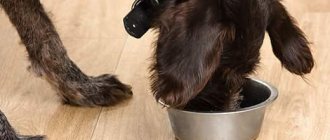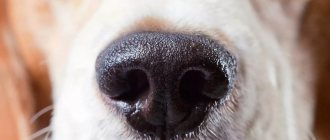Vitamin deficiency in dogs is a disease that develops due to improper nutrition in which there are no vitamins necessary for the animal. A constant deficiency of nutrients leads to lethargy, the development of other diseases and disorders of the internal organs. Often dog owners do not pay special attention to this condition, not even realizing that long-term lack of treatment can lead to the death of the animal.
What is vitamin deficiency in dogs
Problems of supplying dogs with vitamins are quite common, but vitamin deficiency is characterized by a complete absence of any useful substances in the diet. Even experienced veterinarians sometimes confuse the disease with hypovitaminosis or polyavitaminosis. It is worth defining the terms:
- Vitamin deficiency - the disease develops due to a complete lack of vitamins in the dog’s diet;
- Polyvitaminosis is a disease in which an animal lacks several types of vitamins, but enough others;
- Hypovitaminosis is a disease that means a vitamin deficiency in a dog’s diet.
Vitamin deficiency in dogs is considered the most dangerous type of possible vitamin problems.
Hypervitaminosis as a consequence of self-medication
The disease occurs if the body suffers from an excess of vitamins. Dogs that receive monotonous food are prone to this pathology. If a dog has vitamin deficiency, the breeder cannot treat the dog on his own, this leads to dangerous consequences! Incorrect dosages of drugs cause hypervitaminosis and poisoning. It is necessary to ensure that the diet is balanced. If your pet eats natural food and requires it to be enriched with special additives, you should consult your doctor before purchasing them!
Why is hypervitaminosis dangerous? The disease significantly undermines health. The pet's hair begins to fall out, bone structures are affected, and diarrhea occurs periodically. The most dangerous complication is intoxication. Taking too little vitamins can be fatal! If there is an excess of vital components, salts are deposited in the kidneys and liver.
Hypervitaminosis of vitamin D leads to exhaustion, dysfunction of soft tissues and the musculoskeletal system. If there is an overdose of vitamin B1, the animal trembles and the heartbeat quickens. Excess nicotinic acid is very harmful, in this case liver pathologies may occur. If there is too much vitamin C in the body, the animal will experience diarrhea.
Now we know how vitamin deficiency manifests itself in a dog. Let us note once again that treatment is not complete without diet. If treatment is started early, complications can be prevented. Hypervitaminosis is more difficult to treat; therefore, it is important to ensure the prevention of this disease.
Currently reading:
- The drug Vikasol against thrombosis in dogs
- Stop hair loss with vitamins for dogs
- Symptoms of anemia and its treatment in dogs
- How to recognize signs of dog poisoning from rat poisons
Causes of disease development in dogs
In most cases, this condition develops against the background of other diseases or conditions. Veterinarians identify a number of the most common causes of vitamin deficiency in pets:
- Gastrointestinal diseases;
- Worm infestation;
- Infectious diseases requiring high immunity;
- Pregnancy and after childbirth;
- The period of estrus and sexual hunting;
- After treating a dog's illness with antibiotics.
Four-legged animals often suffer from leptospirosis, chlamydia, parvovirus enteritis, mycoplasmosis and canine distemper - such diseases provoke an increased consumption of vitamins by the pet’s body. As a result, the amount of nutrients obtained from food is not enough to cover the body’s needs, and vitamin deficiency develops.
Read Causes of hematobartonellosis in dogs: signs and methods of treatment
Causes of vitamin deficiency and hypovitaminosis
The cause of a lack of vitamins may be a disruption of the gastrointestinal tract, for example, as a result of infestation with worms or treatment with antibiotics that destroy vitamins. Inflammation, ulcers, and tumors of the gastrointestinal tract impair the ability to absorb substances necessary for the body, resulting in the development of vitamin deficiency or hypovitaminosis.
An unbalanced diet does not allow the body to receive the necessary nutrients, for example, if an animal is fed a large amount of fat, while giving a limited amount of protein, then a B2 deficiency is possible.
Even when feeding balanced dry food, where everything seems to be calculated, the dog may develop hypo- or vitamin deficiency. This may be due to the fact that a particular animal has a greater need for a particular vitamin than is contained in the food. Therefore, at certain periods of a dog’s life, for example during pregnancy, feeding puppies, or recovery, it is necessary to replace the usual dry food with a special one.
Symptoms of vitamin deficiency in dogs
The first sign indicating vitamin deficiency is the dog's strange behavior. Pets with problems begin to eat soil, grass, and feces. Other signs include lethargy, apathy, unhealthy appearance, and coat problems. Other symptoms can help determine which specific vitamin is missing.
A deficiency
At the initial stage, the symptoms are invisible, then the dog becomes lethargic, immobile and irritable. In puppies, weight gain and growth are greatly reduced. A distinctive sign is the pet’s severe thirst and refusal to eat. In advanced stages, a dog suffering from vitamin A deficiency develops problems with vision, gastrointestinal tract, and respiratory system.
If retinol deficiency is suspected, veterinarians look into the dog’s oral cavity; if the mucous membranes are dark and dry, this is almost 100% a problem with vitamin A.
B2 deficiency
Refusal to eat becomes critical; the dog even stops eating his favorite treats. Lethargy, low activity, refusal to follow commands. In a month of riboflavin deficiency, a dog can lose up to 5 kilograms in weight. In the future, vision problems and uniform hair loss are also possible.
Prolonged absence of treatment can lead to paresis of the hind limbs. In essence, the animal becomes disabled. All this is accompanied by disturbances in the functioning of the heart and nervous system; inflammation of the mucous membranes and outer layers of the skin is possible.
B5 deficiency
The vitamin is responsible for the metabolism of proteins, fats and carbohydrates that are vital for dogs. With a deficiency of pantothenic acid, indigestion, loss of appetite, apathy and drowsiness are observed. Characterized by increased salivation and a coating of the tongue with a dark coating. There is a high probability of inflammation of the epidermis; puppies in this condition stop growing.
B6 deficiency
The lack of this substance in the body is already quite dangerous. Due to disturbances in the functioning of the nervous system, the dog may suddenly experience seizures. The spectacle is not for the faint of heart: it all starts with increased anxiety and tremors in the limbs, and at the peak the dog may even lose consciousness from pain. After a seizure, the dog looks stunned, most likely it will have a headache, and is poorly oriented in space.
B6 deficiency should not be allowed in a dog - this can lead to anemia or leukopenia. Such diseases lead to death in 40% of cases.
B12 deficiency
B12 deficiency is characterized by severe weight loss in the dog due to lack of appetite. The decrease in body weight is noticeable even without weights; the pet’s ribs are visible. The functioning of the digestive system is disrupted, both diarrhea and constipation are possible. In advanced cases, anemia may develop. In some representatives, the symptom was the appearance of a rash and itching of the skin.
Read Signs and treatment of cystitis in dogs at home
Disadvantage C
This vitamin is very important for the functioning of the internal organs of a dog, as well as a person. Ascorbic acid deficiency is characterized by weakness, drowsiness, and inactivity. The mucous membranes become reddened. Often a sure sign of the disease is bleeding gums.
Blood fractions may also appear in the pet’s feces and urine.
D deficiency
The occurrence of such vitamin deficiency is associated with a lack of calcium and phosphorus in puppies and young dogs under two years of age. Deficiency is characterized by symptoms unusual for the disease:
- Increased and perverted appetite;
- Disorders of the digestive system;
- Convulsions are possible;
- Lameness develops;
- Changing the size of joints;
- Deformation of bone structure;
In addition, a lack of calciferol leads to vomiting, disruption of gait and nervous system function.
Vitamin E
There are no obvious symptoms of this type of vitamin deficiency. The disease can only be suspected in an advanced stage, then the dog’s hind limbs fail and complete paralysis is possible. The function of the reproductive system is impaired. In male dogs, a lack of vitamin E often leads to infertility and impotence.
Vitamin K
The main symptom is considered to be an increased predisposition of the dog’s body to hemorrhages (hemorrhagic diathesis). Any injury can lead to loss of large amounts of blood and serious consequences. In dogs, wounds do not heal well and often begin to fester.
How to use?
Supplements and vitamins are given along with the main food. The method of use of complexes, additives, vitamin mixtures is indicated in the description of a specific product. However, check the dosage with your veterinarian, since during prevention and treatment it can differ significantly.
Don't overfeed with vitamins!
A deficiency of vitamins is bad, but their excess can also be harmful. It is important not to overfeed your pet with vitamins (especially A, D, E). If excess vitamin B is excreted in the urine, then A, D, E do not leave the body so easily; they tend to accumulate for a long time in adipose tissue and the liver. Excess can lead to diseases that can be more serious than vitamin deficiency (impair vision, nervous system and the functioning of the body as a whole).
Look at the symptoms described in the article, remember how long ago you were given food and supplements containing vitamins A, D, E. Write down the names of products, feeds (brands and categories) that were given to your pet during the last 3 months and earlier, if possible . This will make it easier for you to communicate with the veterinarian and, most importantly, help your beloved pet faster and more efficiently.
Treatment of vitamin deficiency in dogs
Therapy consists of taking a specific vitamin or vitamin complexes. The choice of drug should be handled by a veterinarian, and self-medication can lead to unforeseen consequences. Typically, specialists prescribe drugs in the form of tablets, powders or injections:
- 8IN1 EXCEL MULTI VITAMIN SENIOR;
- POLIDEX MULTIVITUM PLUS;
- Beaphar;
- Trivit;
- Pyridoxine;
- Mukovit;
- Cyanocobalamin;
In the initial stages, the doctor may refuse to prescribe medications and will limit himself to recommendations for changing the dog’s diet. The best natural sources of vitamins are eggs, meat, fish, and vegetables.
Vitamin A
With its deficiency, the dog loses its appetite, and it may completely refuse to eat. As a result, the dog develops problems with the digestive tract. For growing animals, a deficiency of this substance can lead to poor growth, as well as dental disease. The animal becomes apathetic and lethargic. You can make up for the deficiency using a proven method by giving your dog fish oil. In addition, vitamin A is found in egg yolks, beef liver and butter. The condition of a dog with vitamin deficiency is shown in the photo below.
Consequences of lack of treatment
The disease will progress and gain momentum. Life expectancy forecast is up to two years, depending on the type of deficiency. Veterinarians highlight the most dangerous consequences:
- Changes in bone structure and skeletal structure;
- Paresis of the hind limbs, disability;
- Liver failure;
- External and internal hemorrhages;
- Anemia;
- Disorders of the nervous system;
- Blindness.
Read Causes and symptoms of strange breathing in dogs
Depending on the type and stage of vitamin deficiency, death can occur either after a month or after 2 years. One thing is certain: if left untreated, the dog will end its life prematurely due to vitamin deficiency.
Which animals are at risk?
Veterinarians know many reasons why a dog may lack vitamins. These are physiological characteristics, health and nutrition problems. But in some situations, pets are especially vulnerable to vitamin deficiency and other pathologies. The following categories of animals are at risk:
- older dogs;
- pets nursing or bearing puppies;
- juveniles;
- animals after illness or surgery;
- street dogs.
Pets that are under increased stress or preparing for exhibitions and competitions also need an additional source of nutrients.
Main types of vitamin deficiencies
The most common vitamin deficiencies in dogs are:
- A.
- B2.
- B5.
- B6.
- D12.
- C.
- D.
- E.
- K.
Dogs often lack vitamin A.
More details
Each of the vitamin deficiencies has its own clinical picture.
- Vitamin A is also called retinol. Pathology is provoked by a lack of fish oil, liver, butter or dairy products.
- Vitamin B5 is otherwise called niacin. Its deficiency is provoked by overfeeding the animal with boiled food and the lack of dairy products and raw meat in the diet. Another provocateur of such vitamin deficiency is the development of gastrointestinal diseases.
- B6 deficiency is caused by eating low-quality, spoiled food. Your dog's diet may include too much protein or store-bought foods that are low in pyridoxine. Long-term use of antibiotics is considered another provocateur.
- The least common vitamin deficiency is B12 , characterized by a lack of cyanocobalamin.
- The lack of C is explained by an excess of flour products. Sometimes such vitamin deficiency occurs against the background of liver pathologies or gastrointestinal diseases.
- D deficiency is most often diagnosed in adolescents. It occurs against the background of a deficiency of calciferol, phosphorus, and calcium.
- A deficiency of E occurs against the background of an excess of rancid fats and spoiled products in the diet. This is the most dangerous type of vitamin deficiency. It contributes to reproductive dysfunction. The pathology causes particular harm to service, hunting and decorative dogs.
- K deficiency occurs due to folloquinol deficiency. Against the background of this vitamin deficiency, hemorrhagic diathesis often develops.
Puppies that are growing may be deficient in vitamin D.
Vitamins for German Shepherd puppies
Vitamin deficiency in German Shepherd puppies is a global problem and its consequence is a deterioration in the dog’s health. Often surges of vitamin deficiency are observed in spring and autumn. Vitamins are necessary for the normal condition of a dog’s body; it is especially important to have a sufficient amount of them in the body of a shepherd puppy for proper development.
Vitamins serve in the dog’s body as regulators of biochemical and physiological processes that underlie the proper performance of body functions. Vitamin deficiency can be expressed to varying degrees.
Prevention
The confrontation between people who argue that feeding dry food is healthier and more balanced than cooked food and owners who insist on the opposite is an eternal debate. Each side has its own arguments, often supported by experience and life stories.
One thing is true that in any case, the food that ends up in a dog’s bowl must meet all the needs and requirements of the animal, including vitamins. Vitamins are not a luxury, but a full-fledged participant in the normal functioning of the entire life system, and the health of their pet and saving it from vitamin deficiency will depend only on the attentive attitude of the owner.
Vitamin E for Shepherd Puppies
Lack of muscle development, pain in the extremities of the paws, age spots, bleeding gums, the appearance of trophic ulcers and skin disorders in shepherd puppies.
Vitamin K
Decreased blood clotting and bleeding gums, weakness and fatigue when walking in shepherd puppies, poorly healing wounds, disturbances in the gastrointestinal tract.
Vitamin P
Lethargy and fatigue, pain and lameness in puppies, hair loss, bleeding gums, skin problems, pinpoint hemorrhages on the skin.
Vitamin PP
Disruption of the gastrointestinal tract, loss of appetite, palpitations, dryness and hair loss, decreased immunity.
Vitamin H (biotin)
Muscle pain, anemia, asymptomatic vomiting in puppies, pale fur and impaired mucous membranes of the eyes, drowsiness, weight loss.











